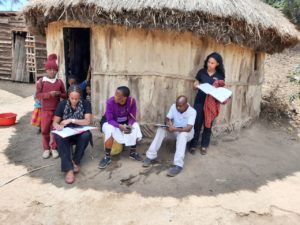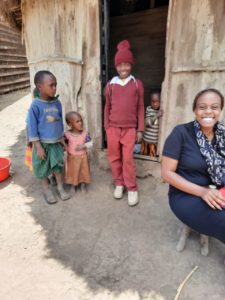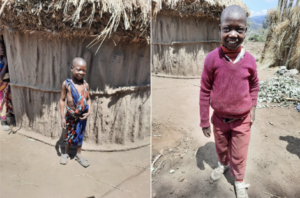
December 2, 2021
The saying goes: “Charity begins at home”. TFFT is truly a place that grants you the privilege to leave your comfort zone and explore the home communities of different people across different regions. Through this experience, we were granted a tangible 3D lens of the realities of our home country. This blog post is the synopsis of the scholar identification experience.
Myself (Elna) and Evelyn (TFFT intern) were enlisted by Haruni to be his right-hand women to undertake the annual process of scholar identification, with the assistance of our logistics officer, Deo, in driving and navigating us around.
 In summary, this is an annual event where TFFT’s Scholarship Program staff venture out to rural areas and scout for students living in vulnerable conditions. This process is conducted using the PPI (Poverty Probability Index) form and a series of questionnaires to identify vulnerability status. We use a qualitative interview methodology to carry out semi-structured interviews with the child’s parents and/or guardians. Final selection is conducted with a panel that discusses, weighs the degrees of separation regarding support from their households, and selects the scholars who are in dire need of support.
In summary, this is an annual event where TFFT’s Scholarship Program staff venture out to rural areas and scout for students living in vulnerable conditions. This process is conducted using the PPI (Poverty Probability Index) form and a series of questionnaires to identify vulnerability status. We use a qualitative interview methodology to carry out semi-structured interviews with the child’s parents and/or guardians. Final selection is conducted with a panel that discusses, weighs the degrees of separation regarding support from their households, and selects the scholars who are in dire need of support.
 Over the course of two-days we visited 21 different children residing in different ends of the country, met new and interesting people, explored the heights of the Usangi region and the developing city of Same. Scholar identification took us to rural schools who struggle to access basic needs but continue to persevere and make the most of their conditions. We interacted with village officials who showed compassion for their community and showed a yearning for the youth to be able to excel. We bought goods from various households in an effort to support them and encourage their hard work to provide for their family doesn’t go in vain. We heard inspiring stories of determination from families and scholars who wanted to see their child go out into the world and make something of themselves. Everywhere we went, we were met with kind smiles and welcoming arms of people who were delighted to know that, unlike everyone, we truly care for them and their family’s welfare.
Over the course of two-days we visited 21 different children residing in different ends of the country, met new and interesting people, explored the heights of the Usangi region and the developing city of Same. Scholar identification took us to rural schools who struggle to access basic needs but continue to persevere and make the most of their conditions. We interacted with village officials who showed compassion for their community and showed a yearning for the youth to be able to excel. We bought goods from various households in an effort to support them and encourage their hard work to provide for their family doesn’t go in vain. We heard inspiring stories of determination from families and scholars who wanted to see their child go out into the world and make something of themselves. Everywhere we went, we were met with kind smiles and welcoming arms of people who were delighted to know that, unlike everyone, we truly care for them and their family’s welfare.
Scholar identification is a multifaceted experience that requires a blended equilibrium of thick skin and compassion. Scouring the mountains of Same, where, although blessed with beautiful views, we find small huts made of mud that are home to individuals that survive off of livestock and agriculture.
Scholar identification requires you to ask tough and invasive questions, whilst bearing no empathy. As you learn the reality of how some people live and make ends meet you are organically forced to address your own privilege and acknowledge the hardships of the community around you.
Scholar identification nudges you to venture into uncharted territories you would never explore on your whim: scour mountains, get hit by endless sand storms, hike steep trails, but treat it as a worthy cause of simultaneously exploring our beautiful country and serving our greater good of the community.

Scholar identification is character building in the sense that you feel this overwhelming responsibility to serve your community, even in the most minuscule way you can afford to, in order to create a huge impact.

One of the children TFFT identified and selected as a new TFFT scholar, Moreen
To say it was a contrasting experience would be a perfect summary of our experience as we have been given space to address our privilege and to extend charity beyond the borders of our city. We learned so much about our country: its economic disparities, the unjust structure of basic resource accessibility, and the lack of educational support in rural schools. We were exposed to so much that would have gone our whole lives not being aware of: how innovative rural life is and how individuals make ends meet. We also gained knowledge about different cultures and their practices. This forced us to preview an outlook of how we live in one country but under such contrasting conditions. If it has brought us any epiphany, it is that there is more to life than living in your comfort zone. We learned that the small things we take for granted are the huge things people are desperately in need of.
Ultimately, we would like to express our appreciation and extend a hearty thank you to TFFT for putting us in what we initially thought was an uncomfortable position, but in actuality was a position of visibility for ourselves to see the realities of living beyond the region and city of Arusha.

Isaka, another child identified during the TFFT Scholarship Identification process
If you are interested in sponsoring a scholar, please contact miller@thefoundationfortomorrow.org